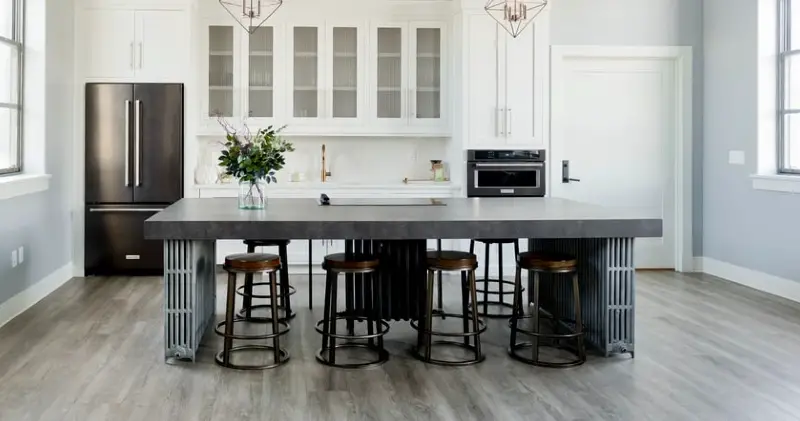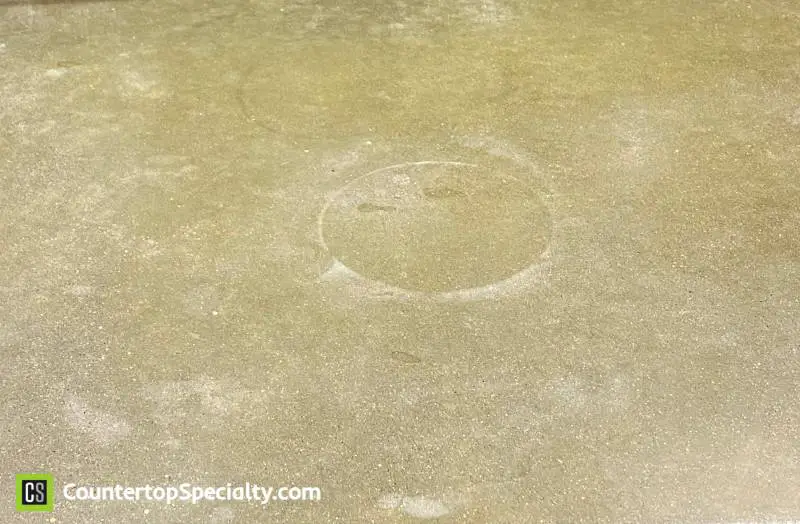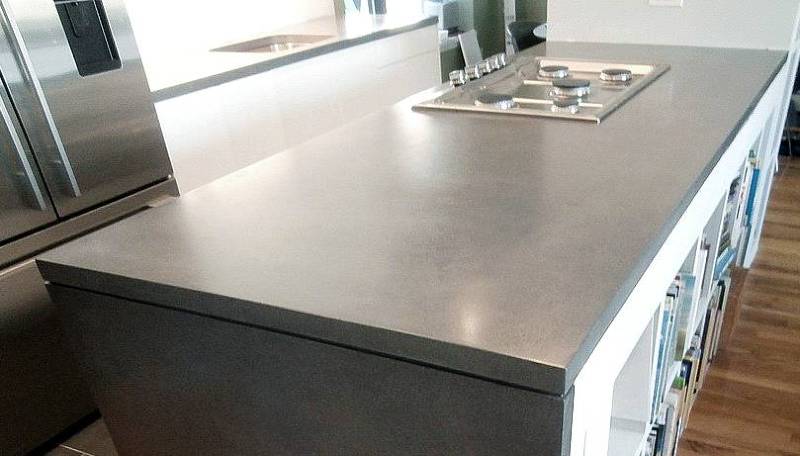How To Clean Concrete Countertops
Learning how to clean concrete countertops before installation or use is a top priority to avoid damage. Concrete countertops have pros and cons and require specific care like any countertop material. This guide will teach you everything you need to know to maintain your kitchen countertops in pristine condition.

ON THIS PAGE
- How To Clean Concrete Countertops: Step-by-Step Guide
- What cleaners are safe for concrete countertops?
- What Products to Use for Disinfecting Concrete Countertops?
- Removing Stains in Concrete Countertops
- How To Make Concrete Countertops Shiny
- How To Avoid Damage To Concrete Countertops
- FAQ: Cleaning Concrete Countertops
How To Clean Concrete Countertops: Step-by-Step
The best way to clean your concrete countertops is with a pH-neutral cleaner following this simple procedure.
Directions:
- Wipe the countertops with a dry, soft cloth to remove debris and dust.
- Spray on a pH-neutral stone or granite countertop cleaner.
- Scrub with a non-abrasive sponge or pad.
- Buff dry with a clean cloth or microfiber towel. A quality concrete cleaner will not need rinsing or leave residue.
- Disinfect your counters (see below) periodically as desired.
- Apply wax to protect and polish when needed.
A pH-neutral cleaner is the best way to clean concrete counters. Avoid soap. Many homeowners make the mistake of using any common (generic or brand-name) household cleaner. Most cleaning products are too harsh for concrete, quartz, and natural stone countertops.
That's when I get an email from the homeowner wondering why they have a nasty discolored spot or haze on their expensive countertops. Often such cleaner damage is permenant on man-made surfaces.
So, the lesson is to always learn what cleaners are safe for your countertop... and don't use dish soap as a regular cleaner.
Soap leaves a film just like soap scum in the shower, no matter how much you rinse. Soap makes the surface dull, dingy, and even harder to keep clean. A pH-neutral cleaner (pH 7-9) is more efficient and effective. Spray on, wipe or scrub with a non-abrasive sponge, and buff dry for no streaks.
Dish soap is often recommended as a cleaning agent for all types of countertops by other websites and even some stone industry professionals because it is safe and won’t harm the surface. But it is messy, requires a lot more time and effort, and creates a soap scum buildup.
Many homeowners prefer to use a commercial concrete cleaner or stone countertop and quartz countertop cleaners like this Granite & Marble Cleaning Spray for quick convenience and no soap scum.
This cleaner is pH-neutral, will not damage the finish, does not need rinsing, and leaves a streak-free shine. It simplifies caring for concrete countertops on a daily basis.
What cleaners are safe for concrete countertops?
Many cleaners and household products can damage concrete. You cannot simply use whatever you have on hand. It’s imperative to learn what products you should use to clean concrete countertops.
Here’s a list of products and cleaners safe for concrete countertops.
- A pH-neutral, non-abrasive cleaner like a Quality Granite Cleaner or the Better Life Natural Cleaner is the best and safest option.
- Apply cleaner with a non-abrasive sponge/soft dish towel/microfiber cloth
- Rubbing alcohol (diluted with water) for disinfecting
- Water
- Spray bottle
- Mild dish soap is "safe" but will leave a dull and dingy film over time.
Concrete Countertop Cleaners to Avoid
You should not use any bleach-based cleaners, abrasive powders, acidic cleaners like vinegar, lemon or citrus, Lysol, or hard water mineral cleaners like CLR for concrete countertop care.
Such harsh or caustic cleaners are not safe and can remove the sealant, discolor the dye, or cause etching and physical damage to the surface and finish like you see in the photo below.
I consult almost daily with customers wondering what caused stains, spots, or other damage to their countertops. Frequently, using the wrong cleaner is the culprit.

Diluted bleach is sometimes an option to remove a stubborn stain (discussed below), but only for a quick application. And you should test it first.
What Products to Use for Disinfecting Concrete Countertops?
Use isopropyl alcohol diluted with water for disinfecting concrete countertops.
- Add a quarter cup of isopropyl alcohol into a spray bottle.
- Add two full cups of water into the bottle and shake well to mix the two liquids.
- Get fancy and add a couple of drops of essential oil for a more pleasant smell.
- Spray the disinfectant solution over the entire surface to form a thin wet film.
- Allow it to dwell for two to three minutes. This dwell time is critical to kill any microbes present. Simply spraying on and wiping off will not disinfect the surface.
- Wipe off the remaining solution and buff dry with a clean cloth.
Important: Note that many brand-name disinfectant products like Clorox Wipes or Lysol Wipes and common sanitizers like bleach and vinegar can cause etching and damage. These may be great for other home cleaning projects but not for concrete.
The Mold & Mildew Remover for granite, quartz, and stone is another option to effectively and safely sanitize countertops. It is non-damaging on all hard surfaces.
Removing Stains in Concrete Countertops
Concrete countertop stains can occur from foods, drinks, harsh chemicals or cleaners, or hard water deposits.
Each type of stain requires a different solution. Sometimes baking soda or bleach, or other damaging cleaners may be needed to get a stain out. So removing a food stain, acid stain, or water rings requires careful attention and detailed explanations.
Our How To Remove Stains in Concrete Countertops page provides a comprehensive guide and step-by-step instructions for removing any type of concrete stain.
How To Make Concrete Countertops Shiny
Several options exist to make your concrete countertop shiny depending on the level of sheen or gloss you’d like and how the concrete surface was finished.
- Polish the concrete countertop surface to a glossy finish using diamond polishing pads.
- Apply a glossy epoxy or urethane topical coating (possible only on a non-polished surface)
- Apply a Color-Enhancing Sealer to create a wet-look sheen and darken the color.
- Apply wax and buff to a high sheen that can be almost shiny but not glossy. (see more on waxing and what to use below)
 photo: Brooks Custom
photo: Brooks CustomThere are pros and cons to each option above and the different types of sealants or topical coatings used to protect the concrete or provide a particular look.
Thoroughly discuss these choices with your concrete countertop fabricator before installation to ensure the result will be what you want.
How To Avoid Damage To Concrete Countertops
Proper cleaning and timely maintenance can help keep your concrete counter tops in good condition for a long time. Here’s how to protect it from damage from heat, scratches, cracks, stains, and so on.
General Care Do’s & Don’ts:
- Use only a pH-neutral (pH 7-9) cleaning solution. Cleaners for stone and quartz are excellent choices with superior performance on concrete too.
- Do not use an abrasive cleaner, acidic cleaner (pH 0-6), or highly alkaline (pH 10+) products.
- Always use quality cutting boards for food prep to avoid scratches from knives.
- Wipe up spills quickly to avoid a stain or etching.
- Set hot pots and pans on trivets << these have a great design and many colors.
- Avoid heavy impact and do not stand on your countertops to prevent chips and cracks.
- Do not slide heavy pots and pans across the surface to avoid scratches.
Sealing Concrete
Sealing your concrete kitchen countertop with an appropriate concrete sealer is necessary to protect against stains.
Several different types of sealants are available and applied depending on how the surface is finished or the concrete mix. White concrete tends to be more stain-resistant.
For sealing concrete countertops you’ll need to choose a topical or penetrating sealer.
Topical coatings can be applied to rough-honed finishes. Penetrating sealers are needed for polished finishes.
Our best recommendation is Stain Proof Permanent Penetrating Sealer.
Waxing Tips & Recommendations
If you’re using a penetrating sealer, you must finish it with a coat of wax. Wax provides additional protection when applied to any finish or sealant. You should apply wax to the cement countertop once or twice a month, especially in the kitchen.
You can check if the wax layer is intact by dropping a bit of water on it. If it doesn’t darken the concrete, it’s okay.
Daddy Van’s Beeswax is our top pick. Very pure product. Don’t use car wax. It has other ingredients that are not good for concrete.
Video: How To Wax Concrete Countertops
Removing Minor Scratches
Most scratches are in the sealer and not in the concrete itself. To repair scratches follow these tips:
- Use a fine-tip artist’s brush to apply additional sealant over the scratch.
- Remove the excess with a cotton swab or a paper towel while the sealant is still wet.
- Carefully use a razor blade to remove any excess dried sealer.
- Buff the area to blend with a fingernail buffing pad or block.
Can I Use Sandpaper on Concrete?
Yes, you can use sandpaper on concrete floors or counter tops to repair etch marks, rough spots, hone or polish the surface, or prep for sealing.
Make sure the surface remains wet when sanding and periodically remove all debris to keep from burnishing the cement. Diamond pads or discs are the best options, but you can use metal or wood sandpaper.
This Manual Marble Polishing Pad Kit is pretty handy for etching repair on concrete.
DIY sanding of small areas is doable, but sanding large areas is best left to professionals.
Best Products for Concrete Countertop Care & Maintenance
General Cleaning:
Granite & Marble Cleaning Spray: pH-neutral, powerful, streak-free shine
Better Life Cleaner: pH-neutral, plant-based, biodegradable
Sanitizing:
Stone Care Mold & Mildew Cleaner
Isopropyl Alcohol + water mix
Sealing:
Color-Enhancing Sealer: darkens the color and adds a "wet-look" sheen
Stain Proof Permanent Penetrating Sealer: impregnating sealer for polished concrete
Daddy Van's Wax: concrete countertop beeswax to protect the sealer and surface
FAQ: Cleaning Concrete Countertops
Are concrete countertops high maintenance?
Yes, concrete countertops require more maintenance compared to other countertop materials. Granite, quartz, quartzite, porcelain, butcher block, laminate, and even marble countertops are not as demanding. Concrete countertops must be sealed and regularly waxed. But even then the surface can be stained, etched, scratched, cracked, chipped, and hot pans can damage sealants. Repairs are often more complicated and expensive than other types of countertops.
How often do you have to seal concrete countertops?
A new concrete countertop sealer should be applied every six months to three years, depending on use and condition. Apply a concrete wax on top of the sealer monthly or as needed for additional stain protection.
What kind of wax do you use on concrete countertops?
Pure Beeswax is the best type of concrete wax to apply. Do not use automotive wax as the additives are not suitable for concrete. Apply the wax over the entire surface with a soft cloth or pad. Rub vigorously and buff to a shine.
Can you use bleach on concrete countertops?
Be careful using bleach on a concrete countertop. You may read elsewhere that using bleach on concrete is okay, but it depends on how the concrete is finished, dyed, and sealed. Bleach can be used with a short contact time to remove some stains, but test first. Bleach and other caustic or acidic cleaners may etch concrete and damage sealants.
Does white vinegar clean concrete countertops?
White vinegar is acidic and should not be used to clean concrete countertops. Acidic or caustic cleaners, including many common household cleaners and brand-name products, can etch concrete causing dull, chalky, rough, and pitted spots.
Can you put hot pans on concrete?
You should never put hot pans or pots on concrete countertops, as the heat can discolor or damage the countertop sealer. Set hot pans on a trivet or hot pad.
How do you make concrete countertops look new again?
Make a concrete countertop look new by honing it, polishing it, and applying a new sealer. Go over the entire surface with 50-grit diamond polishing pads. Progress to finer-grit pads (200, 400, 800, 1600) for the desired level of finish. Apply a concrete stain. Apply the correct concrete sealer for the level of finish.
You May Also Like:
- Concrete Countertops Pros & Cons Guide
- Granite Countertop Do's & Don'ts Cleaning Guide
- Cleaning & Polishing Quartz Countertops
- Recycled Glass Countertops Review & Buyers Guide
- Epoxy Countertops Advantages & Disadvantages


